No one organization can safeguard Colorado's open lands. That's why Gates Family Foundation and land trust leaders launched the Conservation Futures Project.
By Beth Conover, Senior Vice President for Natural Resources and Community Development, Gates Family Foundation
Gates Family Foundation, a member of TFN's Intermountain West Funder Network, has teamed up with Colorado's land trust leaders to launch the Conservation Futures Project. Learn what inspired the project, what it hopes to achieve and why this issue is of vital importance.
As part of its core mission to protect quality of life for future generations of Coloradans, the Gates Family Foundation has invested for decades in the conservation of both public and private land. The foundation’s work helps protect open lands that afford residents and visitors with majestic views, world-class outdoor recreation, and robust working farms and ranches – all of which provide huge economic benefits to the state and contribute to residents’ shared identity as Coloradans.
In communities across the nation, more than 1,000 land trusts serve as vital partners in the conservation and stewardship of open lands. These nonprofit organizations work with local landowners who wish to voluntarily restrict development of their private lands, in order to protect iconic vistas, preserve working farms and ranches, and safeguard waterways and ecosystems. In return, land trusts guarantee to protect and steward the open space under their watch – in perpetuity. In Colorado, nonprofit land trusts are responsible for the stewardship of nearly 80% of the 2.2 million acres of private land conserved statewide. Throughout the national Land Trust Alliance’s 14-state Western region, land trusts have protected over 9 million acres.
Clearly, ensuring the capacity, vibrancy, and sustainability of land trusts is of vital importance to the future of conservation nationwide and in Colorado. Since the 1980s, the Gates Family Foundation has supported land conservation by helping to build the capacity of the field, spur innovations in conservation law, provide leadership training, expand community engagement, and encourage long-term financial planning and stewardship. The people of Colorado are also deeply supportive of land conservation, through state tax credits as well as grants provided by Great Outdoors Colorado – created by voters in 1992 and funded by Colorado Lottery proceeds. Since GOCO’s inception, the Gates Family Foundation has been Colorado’s largest private match source for GOCO-funded land conservation, statewide.
Yet land trusts in Colorado – and nationwide – are facing a host of common challenges ahead. These charitable organizations have operated for decades with land and conservation easement acquisition as a key part of their business model, yet as more of their operating costs shift toward stewardship of those lands, many land trusts are exploring new ways of doing business, fundraising, and building partnerships. Long-term sustainability is of primary importance, as land trusts seek to ensure their endowments are well-positioned for land stewardship in perpetuity, and resilient enough to handle risks and change. A host of other issues – including abandoned or neglected easements, threats to funding sources, political uncertainty, and a dearth of certified conservation easement appraisers – are compounded by the fact that competition among land trusts for limited public and private dollars can make collaborative work more challenging.
With these thorny, sector-wide issues in mind, in 2017 the Gates Family Foundation worked with a number of other funders and land trust partners to convene a series of five all-day meetings. Over the course of the year, topics explored included:
- Valuation, appraisals and tax credits;
- Operating challenges, new service models and potential for collaborative solutions;
- Financial sustainability and best practices for stewardship planning; and
- Strategic communications opportunities and challenges for the Colorado land conservation community.
The open-ended, exploratory meetings resulted in more than just discussion. Propelled on by the urgency of various issues, tangible outcomes of the convening series included:
- A Colorado State University study, which found that each dollar invested by the state for land conservation produced economic benefits of between $4 and $12 for Coloradans;
- Regional meetings that allowed local land trusts to explore opportunities for collaboration around business models and programming;
- A beta version of a financial sustainability calculator tool and best practices for estimating the optimal size and overall health of stewardship endowments; and
- Public policy ideas to address current bottlenecks with land appraisals and tax credit decisions.
A common thread running through all of these issues and solutions was a recognition of the need for more collaborative capacity and leadership at the statewide level. Simultaneous to the Gates-hosted discussions, board members from the Colorado Coalition of Land Trusts (CCLT) were embarking upon their own strategic planning process aimed at increasing the organization’s member engagement and financial sustainability.
As a result, the core group of partners involved in Gates’ 2017 series – including the CCLT board chair and vice chair, and other board members – decided to launch the Conservation Futures Project, a time-bound initiative to unite the state’s land trust community around a common purpose:
- To envision and launch a new, statewide coalition that has the vision, capacity and structure to most effectively guide and support Colorado's land conservation community as it evolves to meet current and future challenges.
- To develop and advance tools for navigating land trusts’ common path forward – such as a stewardship endowment calculator, a modernized valuation model for conservation easements, staff and board training resources, and collaborative models to support local land trusts.
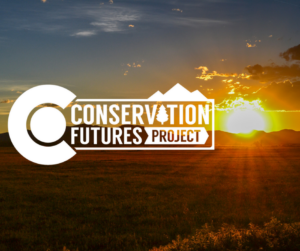 Throughout 2018, the Conservation Futures Project – which is made possible with financial support from Gates, GOCO, and others – will bring diverse funders and land conservation interests to the table to identify a path forward. So far, the project has:
Throughout 2018, the Conservation Futures Project – which is made possible with financial support from Gates, GOCO, and others – will bring diverse funders and land conservation interests to the table to identify a path forward. So far, the project has:
- Established a steering committee with a mandate from the CCLT board to shepherd the process toward developing a new coalition;
- Conducted national research to identify a range of statewide organizations whose models are most effective in serving their constituents and advancing common conservation goals.
- Launched a strategic communications effort – including a project website, newsletter, and outreach plan – to ensure that land trust leaders and conservation advocates throughout the state remain informed and engaged throughout the project.
In the coming months, the Conservation Futures Project will conduct a survey of Colorado’s land conservation community, convene a statewide summit in May, and host regional conversations over the summer. The process will culminate in the development a business plan for a re-imagined, resilient, relevant statewide coalition prepared to lead Colorado’s land conservation community into the future.
If you are interested in learning more about this work, please contact Beth Conover at bconover@gatesfamilyfoundation.org.
About the Author
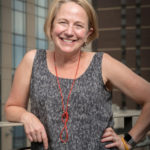 Beth Conover, Senior Vice President – Natural Resources, Rural Communities and Urbanism, Gates Family Foundation. Beth has worked for more than 25 years at the intersection of environmental protection and economic development. She is a senior vice president with the foundation, leading its initiated grant making for natural resources, rural communities and smarter, greener, healthier urbanism. She also chairs the steering commitee for TFN's Intermountain West Funder Network.
Beth Conover, Senior Vice President – Natural Resources, Rural Communities and Urbanism, Gates Family Foundation. Beth has worked for more than 25 years at the intersection of environmental protection and economic development. She is a senior vice president with the foundation, leading its initiated grant making for natural resources, rural communities and smarter, greener, healthier urbanism. She also chairs the steering commitee for TFN's Intermountain West Funder Network.
About the Intermountain West Funder Network
The Intermountain West Funder Network is a unique opportunity for funders to promote meaningful engagement, strengthen communities, and build philanthropic connections that will leverage funding and support for one of the nation’s most iconic and fastest-growing regions.
Our goal is to create a network of funders who can work alongside each other, as well as with their partners in the nonprofit, public, and private sectors, to address local and regional growth and development issues through meaningful community engagement and innovative solutions in the Intermountain West.
Water, water everywhere: Join us for two upcoming webinars focused on important water issues
By: TFN Staff
Water, water everywhere — and so many issues to consider.
Join us for two water-focused webinars this month that will delve into important issues facing communities across the country.
April's TFN Learning Network Webinar, Let's Fix it Together: Effective Ways to Engage Your Community on Water Issues, takes place from 2 to 3 p.m. ET Wednesday April 11. (Register here!)
Community foundations across the country are increasingly engaging on a variety of local water issues, including aging water and wastewater systems, water and human health challenges, flooding and climate resilience, and disaster preparedness.
This learning webinar, organized by TFN's Urban Water Funders, will feature work and insight from community foundations working in diverse regions, including participants in two community foundation initiatives housed at TFN: the California Community Foundation Water Initiative, which is coordinated by Smart Growth California, and the Philanthropic Preparedness, Resiliency and Emergency Partnership (PPREP), a cohort of community foundations in the Missouri River basin. This webinar will also feature the Great Lakes Community Foundation Water Initiative. Funders will discuss effective ways to engage their community on water issues, sharing success stories, lessons learned and opportunities for future improvement. The webinar will also include relevant information for national funders looking to support the working being done on a wide variety of water issues.
(Please register for this funder-only webinar by Friday, April 6, 2018 to be sure that you receive log-in details.)
A second webinar, Clean Water for Community Health and Justice, takes place from 3 to 4:15 p.m. ET Monday, April 16.
TFN is proud to co-sponsor this webinar along with the Biodiversity Funders Group, Environmental Grantmakers Association, and Health and Environmental Funders Network.
These are turbulent times, but some important progress is being made. New alliances across issues and geographies are forming and strengthening around the nation. The Clean Water for All Coalition brings together advocacy organizations with diverse backgrounds, from all levels of interest to protect and strengthen federal protections and funding for clean drinking water and healthy waterways. Likewise, the Health & Environmental Funders Network’s (HEFN) Drinking Water Group is an informal group of funders that is interested in improving children’s and communities’ environmental health, through a focus on access to safe, affordable, accessible drinking water, and continuing efforts to elevate philanthropic attention to drinking water issues.
Please join us for a conversation with colleagues and representatives of the Clean Water For All Coalition, HEFN Drinking Water Group and other groups for a review of the latest progress and targets for action to protect clean drinking water and healthy waterways for everyone.
Speakers include:
• Nancy Stoner, Water Program Director and Senior Fellow, Pisces Foundation
• Amy Panek, Senior Program Officer, Park Foundation
• Rosemary Enobakhare, Campaign Director, Clean Water for All Coalition
• Nsedu Obot Witherspoon, Executive Director, Children’s Environmental Health Network, and Clean Water for All Coalition Steering Committee member
Register for the Clean Water for Community Health and Justice webinar here.
TFN is proud to announce our 2018 PLACES Fellows!
By Tere Figueras Negrete, Director of CommunicationsTFN is proud to announce our 2018 PLACES Fellows — 16 exemplary leaders in philanthropy who will embark on a year-long curriculum focusing on equity and inclusion. A key element of TFN’s mission is to ensure these important values are reflected in the work we do — and ensuring that we support those working in philanthropy with the tools they need to turn ideals into outcomes. For the second year in a row, our fellowship has drawn a record number of applicants from across the U.S. and Canada, and reflect a deep diversity in experience, expertise and backgrounds. As we grapple with the real-life consequences of structural racism and other inequities, it's hard to understate the important role philanthropy can play in these contentious times. PLACES, whose alumni now number more than 100 individuals, is designed to help professionals in philanthropy embed an equity lens into the work they do. Recent cohorts have addressed issues impacting disenfranchised communities, including structural racism, gender justice, health equity, environmental sustainability, economic development and community engagement — asking difficult questions, exploring uncomfortable truths and confronting their own biases along the way. Many of our PLACES fellows and alumni will be at our TFN 2018 Annual Conference in Houston March 19-21. Feel free to ask them about their PLACES experience, and don't hesitate to reach out to me directly if you'd like to know more about this extraordinary fellowship. Join us in congratulating the 2018 PLACES Cohort, and look forward to seeing you in Houston! To learn more about PLACES and to learn more about our 2018 Fellows, visit our PLACES Fellowship page.
|
2018 PLACES Fellows |
|
|
|
|
|
|
|
|
|
|
|
|
|
|
|
|
|
|
|
Thomasina Hiers, director of Baltimore civic site, The Annie E. Casey Foundation |
|
|
|
|
|
|
|
|
|
|
|
|
|
|
|
|
|
|
|
|
|
ABOUT PLACES |
|
|
In 2008, the Funders' Network launched PLACES (Professionals Learning About Community, Equity and Smart Growth), its first philanthropic leadership development initiative. PLACES is designed as a year-long fellowship program that offers tools, knowledge and best practices to enhance funder grantmaking decisions in ways that are responsive to the needs and assets of low-income neighborhoods and communities of color. We are currently at 95 fellows and look forward to going over the 100 mark in 2017. As a result of participating in the PLACES program, fellows develop: An in-depth knowledge of how decisions about growth and development relate to issues of race/ethnicity/class; Check out our most recent newsletter. For more information about the PLACES Fellowship, contact Dion Cartwright at dion@www.fundersnetwork.org. |
This Boston teacher defended his ancestral Mississippi home from bulldozers. Hear his story at #TFN Houston | Sunday Night at the Movies
By Tere Figueras Negrete, Director of CommunicationsHow did a young Boston teacher become an unlikely activist fighting to keep developers from bulldozing his ancestral Mississippi community? Join us for Sunday Night at the Movies as we kick off TFN’s 2018 Annual Conference in Houston with a special screening of the gripping documentary Come Hell or High Water: The Battle for Turkey Creek, which chronicles the painful but inspiring journey of Derrick Evans, a Boston teacher who moves home to Mississippi when the graves of his ancestors are bulldozed to make way for the sprawling city of Gulfport. 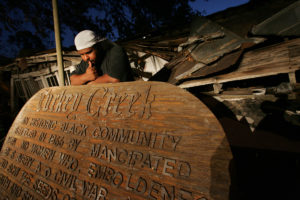 The screening, produced in partnership with the Wyncote Foundation, takes place from 7 to 9 p.m. Sunday, March 18 at the Hotel Zaza in Houston’s thriving Museum District. We’ll be joined after the one-hour film by Leah Mahan, the film’s director, and Christopher Hastings, executive producer and editorial manager of content for WORLD Channel and WORLDChannel.org, for a Q&A session moderated by Laura Isensee of Houston Public Media. Sunday Night at the Movies has become one of the signature events at TFN's Annual Conference, offering timely and relevant documentaries that help shape our conversations about equity, sustainability and resilience—key issues that we'll explore throughout the Houston conference. Come Hell or High Water: The Battle For Turkey Creek is also a notable example of the power of storytelling and the crucial role funders and allies can play in ensuring these important stories are not only told, but heard. Join us for a movie-friendly dinner of pizza, popcorn and sweet treats, plus wine and beer, during the event. |
About the Film |
Bridge the Gulf |
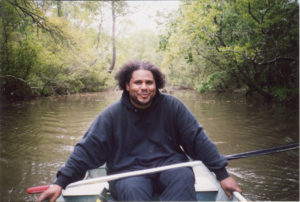 The themes explored and illuminated in the film — such as grappling with the thorny issues of history and race, building strategic alliances, and recognizing the powerful role a mobilized community can play in their own preservation — have a resonance far beyond the banks of Turkey Creek. Mahan and Evans worked with allies to co-found BridgeTheGulfProject.org, a strategic partnership between independent media-makers, regional experts, and grassroots community leaders that has shared more than 700 multimedia stories and other content about the places, cultures, histories, and challenges that define the Gulf Coast region. “The important takeaway is that this is about having a voice, a seat at the table,” said Mahan. “We’re seeing this shift where people tied to the land have a voice, and a recognition of just how powerful those voices can be.” |
About Our Panel |
|
|
|
|
Plan Your TripHave you registered yet? Early bird registration ends this Friday, Feb. 16. Register now! Have you booked your room? We've extended our booking deadline to Feb. 21! Call 1.888.880.3244 for reservations and mention the FUNDERS’ NETWORK to receive the conference rate of $229 plus tax per night. You may also book online using the booking code +TFN. Check out our TFN 2018 Annual Conference page for hotel information, conference highlights and other information. Download our TFN Annual Conference Schedule for a full list of events, speakers and sessions. Or you can download our one-page Schedule-at-a-Glance to help plan your visit. |
Casey's Community Matters webinar will focus on embedding equity in large-scale infrastructure projects
By: TFN Staff
The next webinar in The Annie E. Casey Foundation's Community Matters series will address how to embed equity into large-scale infrastructure projects.
The webinar will be moderated by Scot Spencer, associate director for advocacy and influence at foundation, as well as a TFN board member. Spencer is also a member of the advisory board for TFN's PLACES Fellowship, which focuses on helping leaders in philanthropy embed an equity lens into their work.
Inclusive Procurement: Embedding Equity Into Large-Scale Infrastructure Projects
Wednesday, Feb. 21, 1 p.m. ET.
Trillions of dollars will be spent over the next several years to fix our nation’s aging infrastructure – including our transportation, energy, power and water systems. These public and private investments offer a unique opportunity to advance equity and expand contracting opportunities for minority, women-owned and other disadvantaged businesses (MWDBEs). An intentional shift to inclusive procurement is key to growing America’s business pipeline and advancing wealth-building opportunities for entrepreneurs of color.
This webinar will explore strategies to expand the use of inclusive procurement programs in the infrastructure and construction industries. Experts from the Emerald Cities Collaborative, PolicyLink and the business community will share research from the field and offer best practices to better position MWDBEs to compete for large-scale development projects.
Presenters:
- Scot Spencer, Associate Director for Advocacy and Influence, The Annie E. Casey Foundation (moderator)
- Denise Fairchild Ph.D., President and CEO, Emerald Cities Collaborative
- Rick Moore, Vice President and Director of Community Relations, Swinerton
- Kalima Rose, Vice President for Strategic Initiatives, PolicyLink
- Bernida Reagan, Esq., Director of Community and Client Relations, Merriwether & Williams Insurance Services
- Rodney K. Strong, Chairman, Griffin & Strong, P.C.-
To register here for the online event. Please note the registration password: communi
Once the host approves your registration, you will receive a confirmation email message with instructions on how to join the event.
Casey's Community Matters series explores the complex issues surrounding community change — and the lessons we and others have learned from our work in communities around the country.
Need help registering? Contact Alexandra Roose at the Annie E. Casey Foundation.
How are we rethinking the forests and farms of the Northeast? Join us for a NEFN webinar on new approaches to conservation and economic development
By Tere Figueras Negrete, Director of Communications
There has been a gradual evolution in how we think about and value our natural assets in the forested and farmed landscapes of the Northeast to consider their conventional economic value (wood products, fiber, food) and their value as provider of critical recreational and ecosystem services to rural and urban communities alike.
By testing new approaches to conservation- and asset-based economic development across scales and across the geography of the Northeast, practitioners, academics, foundations, and mission driven investors are creating new ways to support land conservation, ecosystem services, and sustainable businesses. These new approaches, in turn, can provide a broad array of benefits and greater opportunities to people living and working in these places, as well as to our urban neighbors.
Join us for a webinar on Tuesday, February 12, 2018 from 2-3 pm Eastern to hear firsthand from practitioners, researchers, and policy experts.
This webinar will look at how and where this new thinking and strategies are being deployed and how the philanthropic community might help to increase investment in innovative and sustainable economic development. The webinar will look back to examine the historical context of landscape-scale conservation in the region. It will review the diverse assets in our forest and farm communities and more expansive ways of valuing these economic and ecosystem services, locally and regionally, provided by both large-landscapes such as the Northern Forest and more fragmented landscapes. Webinar presenters will share what science tells us about the condition of these assets, in light of a changing climate and increased land development, and explore policies and practices to help conserve and sustainably manage them for people and nature over the long-term. They will also explore the barriers and questions that need to be addressed to help realize the promise of conservation and resource-based community economic development. Speakers will present examples of how conservation organizations, economic development interests, public health entities, small towns, rural communities, cities and urban regions are beginning today to work together more closely toward conservation and community goals.
Join us for the webinar Asset-based Economic Development, Tuesday, February 12, 2018 from 2-3 pm ET to hear firsthand from practitioners, researchers, and policy experts.
Speakers:
Jay Espy, Executive Director, Elmina B. Sewall Foundation (moderator)
Peter Stein, Managing Director, The Lyme Timber Company
Brad Gentry, Senior Associate Dean of Professional Practice, Yale School of Forestry & Environmental Studies
Kathy Lambert, Science & Policy Integration Project Director, Harvard Forest, Harvard University.
Register here for this funders-only webinar.
This webinar is organized by TFN's Northeast Funders Network (NEFN), a developing network of funders who are based in the Northeast States. It aspires to create and grow a community of funders who share and learn together – to be better informed collectively about new models and practices relevant to their work and better positioned to think strategically about its integrated and interconnected nature. Learn more about NEFN here.
Five ways to connect with friends (and maybe make some new ones) at TFN's Annual Conference in Houston
By: TFN StaffOne of the highlights of TFN's 2018 Annual Conference is the chance to network with others working in philanthropy. Join us in Houston for plenty of opportunities to mix and mingle! Below are just a few events where you can reconnect with friends — and maybe make some new ones. (For the introverts among us, don't worry: We've included some handy icebreakers as well.) |
Welcome Reception
For those of you arriving early, join us for drinks and hors d'oeuvres at the Hotel ZaZa, our venue for TFN's 2018 Annual Conference, located in Houston's thriving Museum District. Need an icebreaker? Read 10 Unique Facts About Houston, including the fact that more than 145 languages are spoken in this city. |
Sunday Night at the Movies
Stick around after the Welcome Reception for what's become a favorite kick-off event at our annual conference. Join us for a timely documentary, discussion panel — and plenty of popcorn, pizza and other cinematic refreshments. Need an Icebreaker? Did you know director Wes Anderson is a Houston native? He shot his 1998 film Rushmore at locations around his hometown, including at the Hotel ZaZa (back when it was known as the Warwick.) |
Opening Night Reception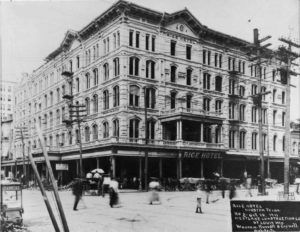 Lawless Spirits and Kitchen Need an Icebreaker? The Lawless is a boon for history buffs.
|
Eat Here! Local Food Reception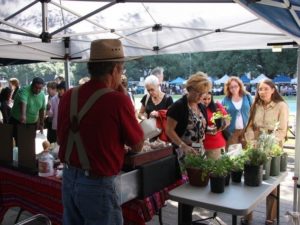 McGovern Centennial Gardens We’re delighted to again feature our annual Eat Here! event, which showcases local ingredients and local food vendors. This year's Eat Here! takes place at McGovern Centennial Park. We're teaming up with Houston-based Urban Harvest, a leader in the local food movement, to curate this signature TFN Annual Conference event. Need an Icebreaker? Located inside the Hermann Park Conservancy, the gardens boast themed outdoor rooms and are home to more than 50 species of trees, 760 hedge shrubs, 55,000 perennial bulbs and 650 azaleas.
|
PLACES Alumni GatheringCurrent and former fellows are invited to join in learning, networking and sharing at the Fourth Annual PLACES Alumni Gathering, which immediately precedes the TFN 2018 Annual Conference. Check out the Fourth Annual PLACES Alumni Gathering Schedule of Events. And don’t miss out on the PLACES Read Between the Wines Book Club: Join fellow PLACES alumni at 5:15 p.m. Tuesday, March 20, for a glass of wine to discuss this year’s book club selection, The Color of Law: A Forgotten History of How Our Government Segregated America. Need an Icebreaker? PLACES alum Bina Patel recently offered some tips on the need for self-care and resiliency in equity work. What's your most effective way to avoid burnout?
|
And Much More...Be sure to check out our TFN 2018 Annual Conference webpage for conference updates, lodging and travel information. (And don't forget to follow us on Twitter: #TFNHOUSTON) Register now and take advantage of our early bird registration! |
Five ways place-based funders can improve relationships with local governments
By Alicia Kitsuse, The Funders' Network
I am a fan of grappling with issues through candid, small-group discussions, and last month's “Navigating Relationships Between Place-Based Funders and Local Governments” funder forum in Ohio reminded me of why.
Jointly organized by the Greater Ohio Policy Center, Philanthropy Ohio, and TFN, the forum brought 15 Ohio-based funders together with a handful of local elected officials for an honest exchange about creating mutually beneficial relationships that move their city forward. In the process, participants on both sides shared their frustrations about working across the philanthropic and public sectors, explained the constraints and pressures under which they operate, and described what real partnership meant from their perspectives. The virtues of the “safe space for dialogue” are already well extolled in our line of work, so let me just say that the forum affirmed my appreciation for the power of frank conversation to create opportunity for insight and change.
The “Navigating Relationships Between Place-Based Funders and Local Governments” forum highlighted how funders can bring complementary capacities and resources to local government that can enhance local revitalization initiatives and drive places forward. Funding out-of-town site visits to seed new ideas and fresh thinking, providing flexible operating support to foster key economic development efforts, and funding best practices research were all cited as important philanthropic investments in Ohio’s revitalizing cities and counties. However, competing visions between funders and government entities and differing demands and constraints on both parties can also stall progress and derail relationships.
Top Five Takeaways for Funders:
Here are the top five lessons I gleaned for funders looking to build effective working relationships with local officials and advance the revitalization cause.
| Take time to lay a groundwork of respect and trust. These fundamentals of interpersonal capital are local funders truest form of currency. Rather than asserting their priorities or rolling out a big idea, funders can show respect for elected and administrative officials by first asking how their foundation can be helpful, and then engaging officials in a discussion about how city and foundation priorities can be melded. Funders can build trust by collaborating on small-scale projects that show visible results. The forum speakers repeatedly invoked baseball metaphors along the line of “hit a bunch of singles” and “celebrate bunts.” |
| Work with officials to invest in data and expertise. Credible research that provides useful measures and benchmarks for your city or county can provide political actors the back-stop they need to support new initiatives. For example, data from an independent organization can provide an important evidence base to justify directing revitalization funding to certain parts of the city. Similarly, outside consulting groups supported by funders can help provide a buffer for politicians when difficult truths need to be delivered to the public or other city officials. |
| Deploy your storytelling capacity. Local foundations’ biggest asset is their ability to use the various communications tools at their disposal to tell stories that highlight the human impact of investments in the community. Partnering with government officials to lift up key local initiatives can build valuable working relationships while also serving an important public interest. |
| Civic engagement is an option. In situations where reasonable efforts to collaborate with local government have failed funders might consider building public support for new initiatives through civic engagement. Engaging disenfranchised groups and using non-traditional methods of engagement (e.g., involving arts organizations or enlisting youth in conducting outreach) can be especially effective in gaining officials’ attention. |
| Tend to the long game. Funders should also be cognizant of their ability to invest in the long-term civic health of their community through programs that develop public leadership talent and skills. Staying focused on the long game can be especially constructive during periods when relationships with local government are frayed and civic trust is low. |
About the Author
Alicia Kitsuse is Director of TFN's Older Industrial Cities Program.
Partners for Places: How L.A.'s 'Great Streets' is strengthening neighborhoods, one main street at a time
By Danyelle O’Hara, Special to the Funders' Network
Few cities in the U.S. are as defined by their urban streetscapes as Los Angeles: About 15 percent of land in the City of Angels is taken up by roadways, meaning the city has more streets than anywhere else in America.
In 2014, L.A. Mayor Eric Garcetti announced the first 15 streets that would benefit from the city’s Great Streets Initiative, intended to improve neighborhood gathering places and revitalize key community corridors.
"The Great Streets Initiative is about strengthening neighborhoods one 'main street' at a time," said Garcetti when the initiative was originally announced.
To accomplish this, the city established the Great Streets Studio, comprised of dedicated staff with an office in City Hall tasked with community outreach and project development — and created with the support of a Partners for Places matching grant.
The Great Streets Studio team became the central coordinating entity for infrastructure planning and development, bringing together the efforts underway as part of the L.A. Housing Departments transit-oriented Consolidated Plan, the Department of City Planning’s Mobility and Health Elements, the Department of Transportation’s Great Streets Strategic Plan, and the L.A. County Metropolitan Transportation Authority’s (Metro) massive build-out of a fixed-guideway transit system.
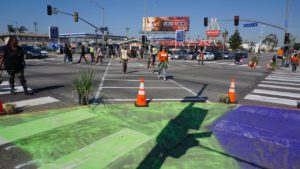
The genesis of its work stretches back to 2011, when the Los Angeles planning commission created the Transportation Corridor Cabinet to consider how to better coordinate around land use, transportation, equity and health issues historically siloed.
The Transportation Corridor Cabinet in turn formed an advisory committee composed of the Metropolitan Transportation Authority’s board of directors, the president of city planning, advisors from community nonprofits and from The California Endowment and the California Community Foundation. Through the various perspectives represented on the committee, a set of strategies was developed to link transportation, land use, and the needs of L.A. communities.
This work was underway at the time of the mayoral transition in LA, so The California Endowment and the California Community Foundation, with support from other funders in Los Angeles, joined with the City’s Office of Sustainability to pursue a Partners for Places grant in 2013 to sustain the Transportation Corridor Cabinet’s work across political administrations.
Los Angeles received a $50,000 grant from Partners for Places, matched by funding from the California Community Foundation and The California Endowment, making a total of $150,000 available to support equitable transit-oriented planning. The funds supported the Great Streets Studio team to coordinate Mayor Garcetti’s Great Streets Initiative.
Ann Sewill, vice president of Health and Housing at the California Community Foundation, said the funding helped ensure that those efforts to connect transportation to issues of equity and health continued. “We saw this grant as a way to highlight this work as a good thing for the new administration, a way to keep the momentum going and deepen it,” she said.
Garcetti, who won the 2013 mayoral election, had highlighted the linkages between transportation, streets, and neighborhoods in his campaign, so it was not surprising when he made Great Streets Studio his first executive directive upon taking office. (Garcetti won reelection in 2017.)
Great Streets Studio has a vision for a transit-oriented Los Angeles that is accessible, affordable, and centered on neighborhoods with great streets as their backbone. To move this vision into action, Great Streets built a system for collaboration, communication, and accountability within city agencies and with community stakeholders. Visioning work started early on by asking L.A. residents how they viewed community access to city programs and resources. This process clarified that many residents shared a perception of city work as “siloed,” with little coordination and communication about resources and investments on community streets. Understanding these perceptions enabled city agencies and departments to develop systems to deliver programs and resources with increased transparency and better alignment with community needs and expectations.
The Green Streets Studio has three major goals:
Empowering: Making L.A. streets the centerpieces of L.A. communities means providing communities with the tools to lead in developing visions for their streets.
Connecting: To implement the changes that communities seek, Great Streets studios connects residents, businesses and organizations to each other and to the tools the city provides, from infrastructure to public art grants, and everything in between.
Developing: When existing city programs or policies can’t meet the needs of Great Streets communities, Great Streets Studio works with colleagues in city government to design and implement new programs.

Photo Credit: Hector Felix Photography
In 2016, the city announced seven winners of the Great Streets Challenge, a program investing $2 million in community-driven initiatives to re-imagine Los Angeles’ iconic commercial corridors. The seven winning projects span from Panorama City to Watts, and from the Westside to Boyle Heights.
As Garcetti says in his message to residents on the Great Streets website: “By reimagining our streetscape, we can create transformative gathering places for Angelenos to come together, whether they travel by car, transit, bike or on foot.”
|
About the author:
Since 1990, Danyelle O’Hara has worked with a range of organizations in the United States and internationally to help build capacity in issues related to community economic development, natural resources management, and community change. In West and Central Africa, Danyelle worked with Catholic Relief Services and the World Wildlife Fund and in the U.S., she has worked as staff to the Center for Community Self-Help and The Conservation Fund, and with numerous organizations as a consultant. Danyelle has a Bachelor’s degree in anthropology and a Master’s in international development education, both from Stanford University, and extensive experience in program development and design, program management, and evaluation.
About Partners for Places: A collaborative matching grant program, Partners for Places creates opportunities for cities and counties in the United States and Canada to improve communities by building partnerships between local government sustainability offices and place-based foundations. Partners for Places is led by TFN and our partners at the Urban Sustainability Directors Network. National funders invest in local projects to promote a healthy environment, a strong economy, and well-being of all residents. Through these projects, Partners for Places fosters long-term relationships that make our urban areas more prosperous, livable, and vibrant. To date, Partners for Places has awarded more than $5 million across North America in this successful matching grant program, leading to more than $10 million in investments.
|
TFN Webinar: What can Sandy and Katrina teach us about putting equitable housing at the forefront of disaster recovery?
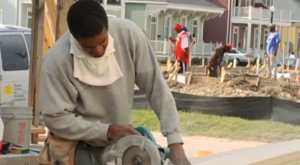
By Tere Figueras Negrete, Director of Communications
From hurricanes and floods to wildfires and mudslides, communities across the U.S. and the Caribbean have been battered by natural disasters in recent months. We know that disasters can quickly exacerbate and escalate economic and social disparities for the most vulnerable — including low-income households, fixed-income seniors and people with disabilities that are the least likely to have adequate resources to fully recover. Evacuated families often face considerable financial and logistical hurdles moving back home. Affordable housing, especially for renters, can prove to be scarce. And the desire for a speedy recovery can often overlook or ignore the need to ensure that those efforts to rebuild are equitable and just.
Join us for a Funders’ Network webinar that looks to the lessons learned in the aftermath of Hurricane Katrina’s devastating toll on New Orleans in 2005 and Hurricane Sandy’s deadly path along the eastern seaboard seven years later. What were the obstacles and opportunities faced while creating equitable housing in the wake of those storms? What important roles did data and storytelling play in these efforts? How can those lessons help funders support recovery in places hit by recent hurricanes — and better prepare communities who may face their own disasters in the future?
Rebuilding and Recovery: Equitable Housing and the Lessons Learned from Hurricanes Sandy and Katrina
Jan. 23
2 p.m.
Register here.
This is a funders-only webinar. Please register by Jan. 19 to be sure you receive the webinar details.
Speakers:
Amy Kenyon, Program Officer, Equitable Development, Ford Foundation (moderator)
Staci Berger, President & CEO, Housing and Community Development Network of New Jersey
Luisa Dantas, Director and Producer of Land of Opportunity, a multi-platform documentary chronicling the reconstruction of New Orleans
Adam Gordon, Associate Director, Fair Share Housing Center
Chrishelle Palay, Houston Co-Director, Texas Housers: Texas Low Income Housing Information Service
(Check out this video produced by Texas Housers about the need for data to understand equity impacts.)
About this series:
This TFN Learning Network Webinar is the latest installment of TFN’s Relief, Recovery and Resiliency Webinar Series, which offers firsthand accounts from impacted areas, insight into philanthropy’s role in relief and recovery efforts, and key lessons from funders and others working to build more sustainable, resilient and equitable communities. These webinars are intended to help frame and inform the conversations leading up to the 2018 TFN Annual Conference in Houston, March 19-21.
Listen to the first installment of the series, Uncertain Waters: Disasters and the Needs of Vulnerable Populations, here.
Stay tuned for details on our February and March Relief, Recovery and Resiliency Webinars!



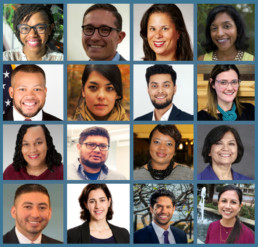
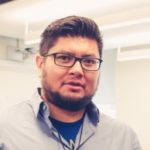

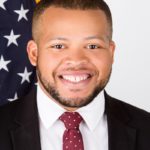



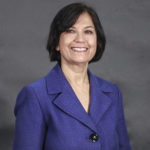

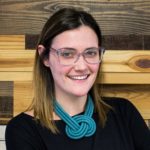

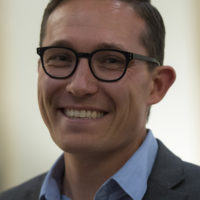 Maarten Jacobs, director of community prosperity,
Maarten Jacobs, director of community prosperity, 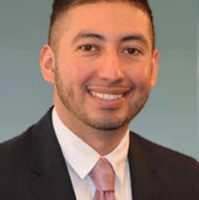 Randy Lopez, program officer,
Randy Lopez, program officer, 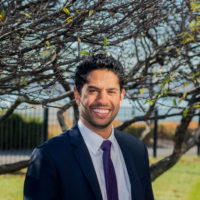 Kumar Raj, program officer,
Kumar Raj, program officer,  Suganthi Simon, westside program officer,
Suganthi Simon, westside program officer, 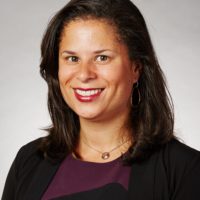 Joanna E.V. Trotter, senior program officer,
Joanna E.V. Trotter, senior program officer, 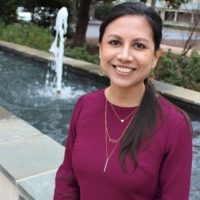 Natalia Valenzuela Swanson, program specialist for healthy eating and active living,
Natalia Valenzuela Swanson, program specialist for healthy eating and active living, 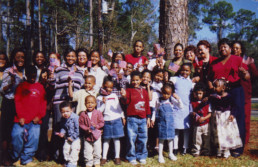
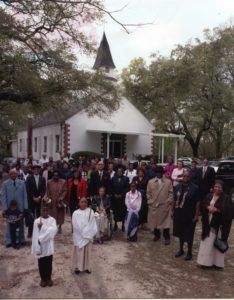
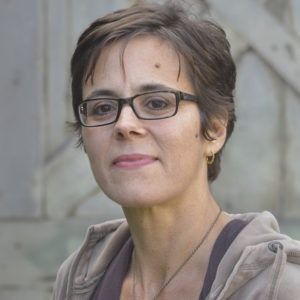
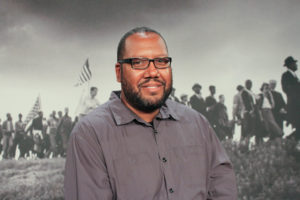
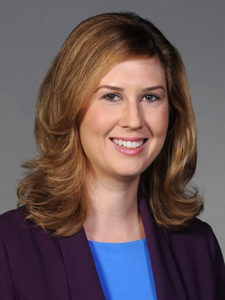

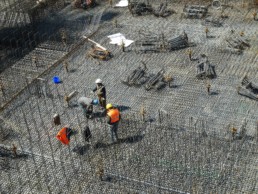
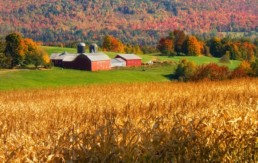
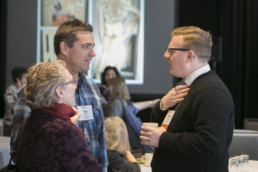


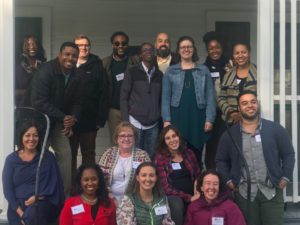
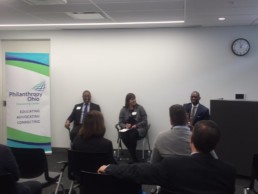
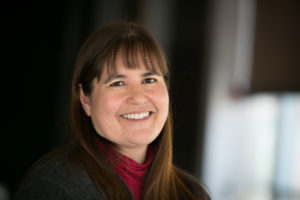
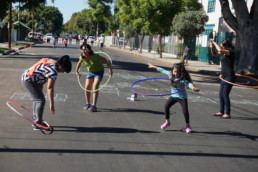
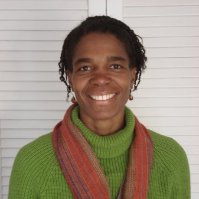 Danyelle O’Hara, Consultant for the Funders' Network
Danyelle O’Hara, Consultant for the Funders' Network